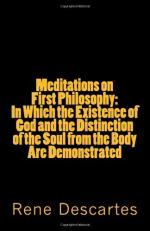If a great number of men of subtle and penetrating wit have not discovered God with one cast of the eye upon nature, it is not matter of wonder; for either the passions they have been tossed by have still rendered them incapable of any fixed reflection, or the false prejudices that result from passions have, like a thick cloud, interposed between their eyes and that noble spectacle. A man deeply concerned in an affair of great importance, that should take up all the attention of his mind, might pass several days in a room treating about his concerns without taking notice of the proportions of the chamber, the ornaments of the chimney, and the pictures about him, all which objects would continually be before his eyes, and yet none of them make any impression upon him. In this manner it is that men spend their lives; everything offers God to their sight, and yet they see it nowhere. “He was in the world, and the world was made by Him, and nevertheless the world did not know Him”—In mundo erat, et mundus per ipsum factus est, et mundus eum non cognovit. They pass away their lives without perceiving that sensible representation of the Deity. Such is the fascination of worldly trifles that obscures their eyes! Fascinatio nugacitatis obscurat bona. Nay, oftentimes they will not so much as open them, but rather affect to keep them shut, lest they should find Him they do not look for. In short, what ought to help most to open their eyes serves only to close them faster; I mean the constant duration and regularity of the motions which the Supreme Wisdom has put in the universe. St. Austin tells us those great wonders have been debased by being constantly renewed; and Tully speaks exactly in the same manner. “By seeing every day the same things, the mind grows familiar with them as well as the eyes. It neither admires nor inquires into the causes of effects that are ever seen to happen in the same manner, as if it were the novelty, and not the importance of the thing itself, that should excite us to such an inquiry.” Sed assiduitate quotidiana et consuetudine oculorum assuescunt animi, neque admirantur neque requirunt rationes earum rerum, quas semper vident, perinde quasi novit as nos magis quam magnitudo rerum debeat ad exquirendas causas excitare.
Sect. IV. All Nature shows the Existence of its Maker.
But, after all, whole nature shows the infinite art of its Maker. When I speak of an art, I mean a collection of proper means chosen on purpose to arrive at a certain end; or, if you please, it is an order, a method, an industry, or a set design. Chance, on the contrary, is a blind and necessary cause, which neither sets in order nor chooses anything, and which has neither will nor understanding. Now I maintain that the universe bears the character and stamp of a cause infinitely powerful and industrious; and, at the same time, that chance (that is, the blind and fortuitous concourse of causes necessary and void of reason) cannot have formed this universe. To this purpose it is not amiss to call to mind the celebrated comparisons of the ancients.




